List of vice presidents of the Philippines

The vice president of the Philippines is the second-highest executive official in the government of the Philippines. The vice president is directly elected by qualified voters to a six-year term, and may be a cabinet member without confirmation from the Commission on Appointments and is first in the presidential line of succession.[1] There have been 15 vice presidents.[2]
History
[edit]The office of vice president was initially created following the ratification of the 1935 Constitution of the Philippines, which states that the vice-president shall be elected by direct vote of the people.[3] Vice presidents during the Commonwealth of the Philippines were under American sovereignty,[4] and there was no office of vice president during the Second Republic,[5] which was considered to be a puppet state of Imperial Japan during World War II.[6] During the martial law declared by President Ferdinand Marcos from 1972 to 1981, the office of the vice-president was abolished and the sitting vice-president, Fernando Lopez, was removed from the office.[5] Though the 1973 Constitution initially did not provide for a vice president, subsequent amendments restored the office.[5] A vice president was appointed after the 1986 election when Marcos and Arturo Tolentino were proclaimed as winners by the Batasang Pambansa. However, in 1986, the People Power Revolution overthrew Marcos' dictatorship and repealed the 1973 Constitution.[5][7] In 2013, the National Historical Commission of the Philippines through Resolution No. 2, series of 2013 declared that Tolentino is not part of the official list of vice presidents of the Philippines.[8] The subsequently formed 1987 Constitution of the Philippines was established, which states that: "There shall be a vice-president who shall have the same qualifications and term of office and be elected with, and in the same manner, as the president."[9]
Before the ratification of the 1987 constitution, in case of an intra-term vacancy, there was no process to appoint a new vice president until after the next election.[5] However, after the ratification of the 1987 constitution, the president could nominate a vice president in case of an intra-term vacancy from a member of the congress, whom both houses vote separately for confirmation by a majority vote.[9] In 2001, Gloria Macapagal Arroyo became president after the Supreme Court of the Philippines ruled that President Joseph Estrada resigned.[10] A few days later, she appointed Teofisto Guingona as the vice president.[11] Guingona is the only person being unelected to the position.[12]
Three vice presidents have succeeded to the presidency due to the death of presidents: Sergio Osmeña in 1944,[13] Elpidio Quirino in 1948,[14] and Carlos P. Garcia in 1957.[15] Fernando Lopez was the longest-serving vice-president, who served for a combined total of almost 11 years. Elpidio Quirino served the shortest time as vice-president for approximately 1 year 11 months. Sara Duterte is the current vice president.[2]
Vice presidents
[edit]| No. | Portrait | Name (Lifespan)
|
Party | Term | Election | President | Era | |
|---|---|---|---|---|---|---|---|---|
| 1 | 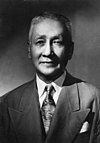
|
Sergio Osmeña (1869–1964) [16] |
Nacionalista | November 15, 1935 – August 1, 1944[a] (9 years, 106 days) |
1935 | Manuel L. Quezon | Commonwealth | |
| 1941 | ||||||||
| Office vacant (August 1, 1944 – May 28, 1946)[b] | Sergio Osmeña | |||||||
| 2 | 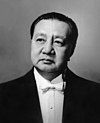
|
Elpidio Quirino (1890–1956) [17] |
Liberal | May 28, 1946 – April 17, 1948[a] (1 year, 323 days) |
1946 | Manuel Roxas | ||
| Third Republic | ||||||||
| Office vacant (April 17, 1948 – December 30, 1949)[b] | Elpidio Quirino | |||||||
| 3 | 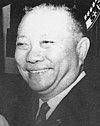
|
Fernando Lopez (1904–1993) [18] |
Liberal (until 1953) |
December 30, 1949 – December 30, 1953 (4 years) |
1949 | |||
| Democratic (from 1953) | ||||||||
| 4 | 
|
Carlos P. Garcia (1896–1971) [19] |
Nacionalista | December 30, 1953 – March 17, 1957[a] (3 years, 77 days) |
1953 | Ramon Magsaysay | ||
| Office vacant (March 17, 1957 – December 30, 1957)[b] | Carlos P. Garcia[c] | |||||||
| 5 | 
|
Diosdado Macapagal (1910–1997) [20] |
Liberal | December 30, 1957 – December 30, 1961 (4 years) |
1957 | |||
| 6 | 
|
Emmanuel Pelaez (1915–2003) [21] |
Liberal | December 30, 1961 – December 30, 1965 (4 years) |
1961 | Diosdado Macapagal | ||
| Nacionalista (from 1964) | ||||||||
| 7 | 
|
Fernando Lopez (1904–1993) [22] |
Nacionalista | December 30, 1965 – January 17, 1973 (7 years, 18 days) |
1965 | Ferdinand Marcos | ||
| 1969 | ||||||||
| Martial Law | ||||||||
| Office abolished (January 17, 1973 – January 27, 1984)[d] | ||||||||
| Fourth Republic | ||||||||
| Office vacant (January 27, 1984 – February 25, 1986)[e] | ||||||||
| 8 | 
|
Salvador Laurel (1928–2004) [23] |
UNIDO (until 1988) |
February 25, 1986 – June 30, 1992 (6 years, 126 days) |
1986[f] | Corazon Aquino[g] | Provisional Government | |
| Fifth Republic | ||||||||
| Nacionalista (from 1988) | ||||||||
| 9 | 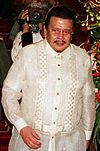
|
Joseph Estrada (born 1937) [24] |
NPC (until 1997) |
June 30, 1992 – June 30, 1998 (6 years) |
1992 | Fidel V. Ramos[h] | ||
| LAMMP (from 1997) | ||||||||
| 10 | 
|
Gloria Macapagal Arroyo (born 1947) [25] |
Lakas–NUCD | June 30, 1998 – January 20, 2001[a] (2 years, 204 days) |
1998 | Joseph Estrada[i] | ||
| Office vacant (January 20 – February 7, 2001) | Gloria Macapagal Arroyo[j] | |||||||
| 11 | 
|
Teofisto Guingona Jr. (born 1928) [26] |
Lakas–NUCD (until 2003) |
February 7, 2001 – June 30, 2004 (3 years, 144 days) | ||||
| Independent (from 2003) | ||||||||
| 12 | 
|
Noli de Castro (born 1949) [27] |
Independent | June 30, 2004 – June 30, 2010 (6 years) |
2004 | |||
| 13 | 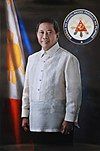
|
Jejomar Binay (born 1942) [28] |
PDP–Laban (until 2012) |
June 30, 2010 – June 30, 2016 (6 years) |
2010 | Benigno Aquino III[k] | ||
| UNA (from 2012) | ||||||||
| 14 | 
|
Leni Robredo (born 1965) [29] |
Liberal | June 30, 2016 – June 30, 2022 (6 years) |
2016 | Rodrigo Duterte[l] | ||
| 15 | 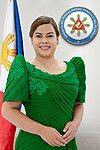
|
Sara Duterte (born 1978) [30] |
Lakas–CMD (until 2023) |
June 30, 2022 – present (2 years, 156 days) |
2022 | Bongbong Marcos[m] | ||
| Hugpong ng Pagbabago[n] | ||||||||
Timeline
[edit]
Unofficial vice presidents
[edit]Historians and other figures have identified the following people as having held the vice-presidency of a government intended to represent the Philippines, but their terms of office are not counted by the Philippine government as part of the presidential succession.
The inclusion of Mariano Trías in the list is disputed, because Trias was chosen as vice-president at the Tejeros Convention, and again as vice-president for the short-lived Republic of Biak-na-Bato, which was dissolved after the signing of the Pact of Biak-na-Bato and Aguinaldo's exile. Neither the reassumption of power by Emilio Aguinaldo when the revolution was resumed in May 1898 nor his formal proclamation and inauguration as president under the First Philippine Republic in 1899 were regimes that provided for a vice-presidency.[31]
| Portrait | Name (Lifespan) |
Party | Term | President | Era | |
|---|---|---|---|---|---|---|

|
Mariano Trías (1868–1914) [32] |
None[o] | March 22, 1897 – January 23, 1899 (1 year, 307 days) |
Emilio Aguinaldo | Tejeros Convention | |
| Republic of Biak-na-Bato | ||||||

|
Francisco Carreón (1868–1939/1941) [33] |
None[o] | May 6, 1902 – July 14, 1906[p] (3 years, 296 days) |
Macario Sakay | Tagalog Republic | |

|
Ramón Avanceña (1872–1957) [34] |
Kapisanan ng Paglilingkod sa Bagong Pilipinas Association for Service to the New Philippines |
October 14, 1943 – January 15, 1944 (93 days) |
Jose P. Laurel | Second Republic | |

|
Benigno Aquino Sr. (1894–1947) [34] |
Kapisanan ng Paglilingkod sa Bagong Pilipinas Association for Service to the New Philippines |
January 15, 1944 – August 17, 1945 (1 year, 272 days) | |||

|
Ramón Avanceña (1872–1957) [34] |
Liberal Party | December 30, 1948 – December 30, 1949 (1 year, 0 days) |
Elpidio Quirino | Third Republic | |
Vice presidents later served as president
[edit]Vice presidents
[edit]| Vice president | President served under | Year(s) served | Notes |
|---|---|---|---|
| Sergio Osmeña | Manuel L. Quezon | 1935–1944 | Osmeña succeeded Quezon, after the latter's death |
| Elpidio Quirino | Manuel Roxas | 1946–1948 | Quirino succeeded Roxas, after the latter's death; ran and won a full term in 1949. |
| Carlos P. Garcia | Ramon Magsaysay | 1953–1957 | Garcia succeeded Magsaysay, after the latter's death; ran and won a full term in 1957. |
| Diosdado Macapagal | Carlos P. Garcia | 1957–1961 | Macapagal defeated Garcia in 1961. |
| Joseph Estrada | Fidel V. Ramos | 1992–1998 | Estrada ran for a full term in 1998. |
| Gloria Macapagal Arroyo | Joseph Estrada | 1998–2001 | Arroyo succeeded Estrada, after the latter's resignation; ran and won a full term in 2004. |
List of vice presidents by offices held before vice presidency
[edit]Executive branch
[edit]Cabinet secretaries (as full-time)
[edit]The following cabinet secretaries are only served for fulltime. Vice presidents served as cabinet secretary concurrently, and post-vice presidency positions are not included.
| Secretary | Office | President served under | Year(s) served |
|---|---|---|---|
| Elpidio Quirino | Secretary of Finance | Manuel Quezon | 1934–1936 |
| Secretary of Interior | 1935–1938 | ||
| Teofisto Guingona Jr. | Secretary of Justice | Fidel V. Ramos | 1995–1998 |
Other positions (as full-time)
[edit]| Name | Office | President served under | Year(s) served |
|---|---|---|---|
| Teofisto Guingona | Chairman, Commission on Audit | Corazon Aquino | 1986–1987 |
| Executive Secretary of the Philippines | Fidel V. Ramos | 1993–1995 | |
| Gloria Macapagal Arroyo | Undersecretary of the Department of Trade and Industry | Corazon Aquino | 1987–1992 |
| Jejomar Binay | Chairman of the Metropolitan Manila Development Authority | Corazon Aquino | 1990–1991 |
| Joseph Estrada | 1999–2001 |
Legislative
[edit]Senators
[edit]| Senator | District | Year(s) served | Notes |
|---|---|---|---|
| Sergio Osmeña | 10th | 1922–1935 | First vice president to serve as president pro tempore (1922–1934) |
| Elpidio Quirino | 1st | 1925–1935; 1945–1946 | Second vice president to serve as president pro tempore (1945–1946) |
| Fernando Lopez | At-large | 1947–1949 | As a Liberal |
| 1953–1965 | As a Democrat and Nacionalista; third vice president to serve as president pro tempore (1958–1965); Only former vice president to be elected again in the same position. | ||
| Carlos P. Garcia | 1945–1953 | First vice president to serve as the minority floor leader (1946–1953) | |
| Emmanuel Pelaez | 1953–1959 | Only former vice president elected in the Senate | |
| Salvador Laurel | 1967–1972 | Did not finished term due to martial law | |
| Joseph Estrada | 1987–1992 | ||
| Gloria Macapagal Arroyo | 1992–1998 | First term only three years; did not finished second term, won vice presidency | |
| Teofisto Guingona Jr. | 1987–1993 | Second vice president to serve as president pro tempore (1987–1990)
Only vice president to serve as the majority floor leader (1990–1991); did not finish second term, appointed as the executive secretary | |
| 1998–2001 | Second and last vice president to be the minority floor leader, 1998–2001
Did not finished term, appointed to the vice presidency | ||
| Noli De Castro | 2001–2004 | Did not finished term, won vice presidency |
Congressman/Representatives/Assemblyman
[edit]| Legislator | District | Lower House Name | Year(s) served | Notes |
|---|---|---|---|---|
| Sergio Osmeña | Cebu 2nd | Philippine Assembly | 1907–1916 | First president to serve as speaker (1907–1916) |
| House of Representatives | 1916–1922 | |||
| Elpidio Quirino | Ilocos Sur 1st | House of Representatives | 1919–1925 | |
| Carlos P. Garcia | Bohol 3rd | 1925–1931 | ||
| Diosdado Macapagal | Pampanga 1st | 1949–1957 | ||
| Leni Robredo | Camarines Sur 3rd | 2013– 2016 | Only one term congressperson won the vice presidency |
Local government
[edit]Governors
[edit]| Governor | Province | Year(s) served | Notes |
|---|---|---|---|
| Sergio Osmeña | Cebu | 1904–1907 | |
| Carlos P. Garcia | Bohol | 1933–1941 | |
| Jejomar Binay | Metro Manila | 1987–1988 | Acting/Interim basis |
Mayors
[edit]| Mayor | Province | Year(s) served | Notes |
|---|---|---|---|
| Fernando Lopez | Iloilo | 1945–1947 | Appointed |
| Joseph Estrada | San Juan | 1969–1986 | Only former vice president served as mayor and only former vice president to serve as mayor to another city (2013–2019) |
| Jejomar Binay | Makati | 1986–1987 | OIC mayor |
| 1988–1998 | Elected; first vice president without congressional experience. | ||
| 2001–2010 | |||
| Sara Duterte | Davao City | 2010–2013; 2016–2022 | Only vice president served as vice mayor (2007–2010); second vice president without congressional experience. |
Vice presidents by offices concurrently held
[edit]Cabinet secretaries
[edit]| Secretary | Office | President served under | Year(s) served |
|---|---|---|---|
| Sergio Osmeña | Secretary of Public Instruction | Manuel Quezon | 1935–1940 |
| Secretary of Public Instruction, Health, and Public Welfare | 1941–1944 | ||
| Elpidio Quirino | Secretary of Foreign Affairs | Manuel Roxas | 1946–1950 |
| Fernando Lopez | Secretary of Agriculture and Natural Resources | Elpidio Quirino | 1949–1953 |
| Ferdinand Marcos | 1965–1971 | ||
| Carlos P. Garcia | Secretary of Foreign Affairs | Ramon Magsaysay | 1953–1957 |
| Emmanuel Pelaez | Diosdado Macapagal | 1961– 1963 | |
| Salvador Laurel | Corazon Aquino | 1986–1987 | |
| Gloria Macapagal Arroyo | Secretary of Social Welfare and Development | Joseph Estrada | 1998–2000 |
| Teofisto Guingona Jr. | Secretary of Foreign Affairs | Gloria Macapagal Arroyo | 2001–2002 |
| Sara Duterte | Secretary of Education | Bongbong Marcos | 2022–2024 |
Other positions
[edit]| Name | Office | President served under | Year(s) served |
|---|---|---|---|
| Joseph Estrada | Chairman of the Presidential Anti-Crime Commission | Fidel V. Ramos | 1992–1997 |
| Noli De Castro | Chairman of the Housing and Urban Development Coordinating Council | Gloria Macapagal Arroyo | 2004–2010 |
| Jejomar Binay | Chairman of the Housing and Urban Development Coordinating Council | Benigno Aquino III | 2010–2015 |
| Presidential Adviser for Overseas Filipino Workers | |||
| Leni Robredo | Chairperson of the Housing and Urban Development Coordinating Council | Rodrigo Duterte | 2016 |
| Co-chairperson of the Inter-Agency Committee on Anti-Illegal Drugs | 2019 |
List of vice presidents by age
[edit]| No. | President | Born | Age at start of vice presidency | Age at end of presidency | Post-vice presidency timespan | Lifespan | |
|---|---|---|---|---|---|---|---|
| Died | Age | ||||||
| 1 | Sergio Osmeña | September 9, 1878 | 57 years, 2 months, 7 days November 15, 1935 |
65 years, 10 months, 23 days August 1, 1944 |
17 years, 2 months, 8 days | October 19, 1961 | 83 years, 47 days |
| 2 | Elpidio Quirino | November 16, 1890 | 55 years, 6 months, 12 day May 28, 1946 |
57 years, 5 months, 1 day April 17, 1948 |
9 years, 9 month, 1 days | February 29, 1956 | 65 years, 105 days |
| 3 | Fernando Lopez | April 13, 1904 | 45 years, 8 months, 17 days December 30, 1949 |
49 years old, 8 months, 17 days December 30, 1953 |
16 years, 0 month, 0 days | May 26, 1993 | 89 years, 43 days |
| 4 | Carlos P. Garcia | November 4, 1896 | 57 years, 1 months, 26 days December 30, 1953 |
60 years, 5 months, 14 days March 18, 1957 |
14 years, 2 months, 27 days | June 14, 1971 | 74 years, 222 days |
| 5 | Diosdado Macapagal | September 28, 1910 | 47 years, 3 months, 2 days December 30, 1957 |
51 years, 3 months, 2 days December 30, 1961 |
35 years, 3 months, 28 days | April 21, 1997 | 86 years, 205 days |
| 6 | Emmanuel Pelaez | November 30, 1915 | 46 years, 1 month, 0 day December 30, 1961 |
50 years, 1 month, 0 day December 30, 1965 |
37 years, 6 months, 27 days | July 27, 2003 | 87 years, 239 days |
| 7 | Fernando Lopez | April 13, 1904 | 59 years, 5 months, 5 days December 30, 1965 |
68 years, 5 months, 10 days September 23, 1972 |
20 years, 8 months, 5 days | May 26, 1993 | 89 years, 43 days |
| 8 | Salvador Laurel | November 18, 1928 | 57 years old, 3 months, 7 days February 25, 1986 |
63 years old, 7 months, 12 days June 30, 1992 |
11 years, 6 month, 28 days | January 27, 2004 | 75 years, 70 days |
| 9 | Joseph Estrada | April 19, 1937 | 55 years, 2 months, 17 days June 30, 1992 |
61 years, 2 months, 11 days June 30, 1998 |
(Living) | (Living) | 87 years, 228 days |
| 10 | Gloria Macapagal Arroyo | April 5, 1947 | 51 years, 2 months, 25 days June 30, 1998 |
53 years, 9 months, 15 days January 20, 2001 |
(Living) | (Living) | 77 years, 242 days |
| 11 | Teofisto Guingona Jr. | July 4, 1928 | 72 years, 7 months, 3 days February 7, 2001 |
75 years, 11 months, 26 days June 30, 2004 |
(Living) | (Living) | 96 years, 152 days |
| 12 | Noli De Castro | July 6, 1949 | 54 years, 11 months, 24 days June 30, 2004 |
60 years, 11 months, 24 days June 30, 2010 |
(Living) | (Living) | 75 years, 150 days |
| 13 | Jejomar Binay | November 11, 1942 | 67 years, 7 months, 19 days June 30, 2010 |
73 years, 7 months, 19 days June 30, 2016 |
(Living) | (Living) | 82 years, 22 days |
| 14 | Leni Robredo | April 23, 1965 | 51 years, 2 months, 7 days June 30, 2016 |
57 years, 2 months, 10 days June 30, 2022 |
(Living) | (Living) | 59 years, 224 days |
| 15 | Sara Duterte | May 31, 1978 | 44 years, 0 month, 30 days June 30, 2022 |
(Incumbent) | (Incumbent) | (Living) | 46 years, 186 days |
See also
[edit]- President of the Philippines
- List of presidents of the Philippines
- Prime Minister of the Philippines (defunct)
Notes
[edit]- ^ a b c d Succeeded to the presidency.
- ^ a b c Under the 1935 Constitution, a vacancy in the vice presidency could not be filled.
- ^ Affiliated with the Nacionalista Party.
- ^ The 1973 Constitution did not provide for a vice president.
- ^ The 1973 Constitution was amended in 1984 to restore the vice presidency, but an election was not called until 1986.
- ^ In the 1986 vice presidential election, Arturo Tolentino was declared the winner by the Batasang Pambansa and the Commission on Elections, while Salvador Laurel was declared the winner by the National Citizens' Movement for Free Elections. The fraudulent conduct and disputed result of the election led to the People Power Revolution.
- ^ Affiliated with UNIDO at election until 1988.
- ^ Affiliated with Lakas–NUCD.
- ^ Affiliated with LAMMP.
- ^ Affiliated with Lakas–CMD.
- ^ Affiliated with the Liberal Party.
- ^ Affiliated with the PDP–Laban.
- ^ Affiliated with Partido Federal ng Pilipinas.
- ^ Affiliated with both Lakas–CMD and Hugpong ng Pagbabago at election; resigned from Lakas–CMD on May 19, 2023.
- ^ a b Allied with the Magdalo faction of the revolutionary society Katipunan.
- ^ Term ended with his capture by the American Forces.
References
[edit]- ^ Rappler (b) (2021).
- ^ a b ABS-CBN news (2016).
- ^ Constitution of the Philippines (1935) § Article VII: Executive Department
- ^ Ooi (2004), p. 387.
- ^ a b c d e Vice president of the Philippines.
- ^ Vellut (1964), p. 128.
- ^ BBC News (2016).
- ^ "Resolution Clarifying the Issue of Legitimacy of the Vice-Presidentcy of Arturo Tolentino in the 1986 Snap Elections" (PDF). National Historical Commission of the Philippines. March 11, 2023. Retrieved January 25, 2024.
- ^ a b Constitution of the Philippines (1987) § Article VII: Executive Department
- ^ The Wall Street Journal (2001).
- ^ Tehran Times (2001).
- ^ Santos, Sammy. "Tito quits Lakas over slow reforms". Philstar.com. Retrieved January 23, 2024.
- ^ Zaide (1999), pp. 348–349.
- ^ Zaide (1999), p. 357.
- ^ Zaide (1999), p. 361.
- ^ Vice president of the Philippines; De Guzman & Reforma (1988), p. 42, 118; St. Louis Star-Times (1935); The Caledonian-Record (1935); Zaide (1999), p. 319.
- ^ Vice president of the Philippines; De Guzman & Reforma (1988), p. 119–120; Spokane Chronicle (1946); The Courier-Journal (1948); Zaide (1999), p. 353.
- ^ Vice president of the Philippines; The Californian (1949); Senate of the Philippines (a).
- ^ Vice president of the Philippines; De Guzman & Reforma (1988), p. 120; The Spokesman-Review (1953); Fort Worth Star-Telegram (1957); Zaide (1999), p. 361.
- ^ Vice president of the Philippines; De Guzman & Reforma (1988), pp. 121–122; The Honolulu Advertiser (1957); Calgary Herald (1961); Zaide (1999), p. 361.
- ^ Vice president of the Philippines; Guam Daily News (1961); Senate of the Philippines (b); Zaide (1999), p. 362.
- ^ Vice president of the Philippines; Chicago Tribune (1965); Senate of the Philippines (a); Zaide (1999), p. 363.
- ^ Vice president of the Philippines; Hartford Courant (1986); The Windsor Star (1992); Zaide (1999), p. 400.
- ^ Vice president of the Philippines; Encyclopædia Britannica & 2021(a); Senate of the Philippines (c); Economic and Political Weekly; Zaide (1999), p. 407.
- ^ Vice president of the Philippines; Encyclopædia Britannica & 2021(b); Senate of the Philippines (d); Rodell (2002), p. 219; Zaide (1999), p. 411.
- ^ Vice president of the Philippines; Senate of the Philippines (e); Gulf News (2001).
- ^ Vice president of the Philippines; Rappler (2021); The New York Times (2004).
- ^ Vice president of the Philippines; Rappler (2016); The New York Times (2013).
- ^ Vice president of the Philippines; Rappler (2016); Reuters (2021).
- ^ Reuters (2022).
- ^ "Office of the Vice President". Official Gazette of the Republic of the Philippines. Retrieved June 1, 2016.
- ^ Zaide (1999), p. 247.
- ^ National Historical Institute of the Philippines.
- ^ a b c Los Angeles Times (1943); The Decatur Daily (1945).
Works cited
[edit]Books and journals
- De Guzman, Raul P.; Reforma, Mila A., eds. (1988). Government and politics of the Philippines. Oxford University Press. ISBN 978-0-19-588871-3. LCCN 88001474. OL 2526300M.
- "Joseph Estrada". Economic and Political Weekly. ISSN 0012-9976. Retrieved November 18, 2021.
- Ooi, Keat Gin (2004). Southeast Asia : A Historical Encyclopedia, from Angkor Wat to East Timor. ABC-CLIO. OCLC 1000411290.
- Rodell, Paul A. (2002). "The Philippines: Gloria 'in Excelsis". Southeast Asian Affairs. 2002: 215–236. doi:10.1355/SEAA02M. JSTOR 27913210.
- Vellut, J. L. (1964). "Foreign Relations of the Second Republic of the Philippines, 1943–1945". Journal of Southeast Asian Studies. 5 (1). Cambridge University Press: 126–142. doi:10.1017/S0217781100002246. JSTOR 20067478.
- Zaide, Sonia M. (1999). The Philippines : A Unique Nation. All-Nations Publishing. ISBN 978-971-642-064-7. LCCN 2004420900. OL 3362336M.
Articles
- Cruz, Enrico Dela (June 19, 2022). "Duterte's daughter sworn in as Philippines vice president". Reuters. Retrieved August 10, 2022.
- "Leni Robredo takes oath as 14th VP". ABS-CBNnews.com. June 30, 2016. Retrieved December 19, 2021.
- "How Filipino People Power toppled dictator Marcos". BBC News. February 17, 2016. Retrieved December 19, 2021.
- "A Rare Filipino Is at the Helm". Calgary Herald. December 14, 1961. Retrieved November 18, 2021 – via Newspapers.com.
- "Philippines' Marcos Sworn In". Chicago Tribune. December 30, 1965. Retrieved November 18, 2021 – via Newspapers.com.
- "Body of Filipino President Found in Plane Wreckage". Fort Worth Star-Telegram. March 18, 1957. Retrieved November 16, 2021 – via Newspapers.com.
- "P.I. Congress Meeting Today To Canvass Election Returns". Guam Daily News. December 12, 1961. Archived from the original on November 18, 2021. Retrieved November 18, 2021 – via Newspapers.com.
- Felongco, Gilbert (February 10, 2001). "Guingona sworn in as vice president". Gulf News. Retrieved November 18, 2021.
- Briscoe, David (February 26, 1986). "Aquino's New Challenged: Communism, Popular Expectation". Hartford Courant. Archived from the original on November 18, 2021. Retrieved November 18, 2021 – via Newspapers.com.
- "U.S. Disavows Jap Puppet Rule in Philippines". Los Angeles Times. October 23, 1943. Retrieved December 14, 2021 – via Newspapers.com.
- Cupin, Bea (June 27, 2016). "VP to VP: Binay, Robredo meet ahead of inauguration". Rappler. Archived from the original on October 11, 2021. Retrieved November 18, 2021.
- "Powers and Duties: President, Vice President of the Philippines". Rappler. April 27, 2021. Archived from the original on October 15, 2021. Retrieved December 19, 2021.
- Cupin, Bea (November 4, 2021). "After backing out of Senate run, Noli de Castro returns to ABS-CBN". Rappler. Retrieved November 18, 2021.
- Morales, Neil Jerome; Lema, Karen (October 7, 2021). "Philippine Vice President Robredo joins race for president". Reuters. Archived from the original on October 7, 2021. Retrieved November 18, 2021.
- "Tears and Joy as Philippines Become Free". Spokane Chronicle. July 4, 1946. Retrieved November 12, 2021 – via Newspapers.com.
- "Philippine's New Regime Launched". St. Louis Star-Times. November 14, 1935. Retrieved November 12, 2021 – via Newspapers.com.
- "Arroyo Chooses Guingona as Philippine VP". Tehran Times. February 7, 2001. Retrieved December 19, 2021.
- Wilkins, Ford (November 14, 1935). "Quezon, Philippine Political Genius, President in All But Title Since 1916". The Caledonian-Record. Retrieved November 10, 2021 – via Newspapers.com.
- "Filipino President Pledges Nation to Fight Communism". The Californian. December 3, 1949. Retrieved November 14, 2021 – via Newspaper.com.
- "President Roxas of Philippines Dies After Speech Assailing Red Aggression". The Courier-Journal. April 16, 1948. Archived from the original on November 12, 2021. Retrieved November 12, 2021 – via Newspapers.com.
- "MacArthur in Frank Works Warns Nation". The Decatur Daily. September 16, 1945. Retrieved December 14, 2021 – via Newspapers.com.
- "Ball at Royal Hawaiian Hotel To Mark Filipino Inauguration". The Honolulu Advertiser. December 27, 1957. Archived from the original on November 18, 2021. Retrieved November 18, 2021 – via Newspapers.com.
- Conde, Carlos H. (June 24, 2004). "Philippine Congress proclaims Arroyo winner". The New York Times. Retrieved November 18, 2021.
- "Philippines: Rebels Agree to Cease-Fire". The New York Times. September 13, 2013. Retrieved November 18, 2021.
- "Manila To Hail Third President". The Spokesman-Review. December 30, 1953. Retrieved November 16, 2021 – via Newspapers.com.
- "Estrada Resigns as Philippine President; Vice President Is Immediately Sworn In". The Wall Street Journal. January 20, 2001. Retrieved December 19, 2021.
- Wurfel, David (July 4, 1992). "Ramon Under The Gun As New President". The Windsor Star. Retrieved November 18, 2021 – via Newspapers.com.
Online sources
- "Joseph Estrada". Encyclopædia Britannica. April 15, 2021. Archived from the original on November 18, 2021. Retrieved November 18, 2021.
- "Gloria Macapagal Arroyo". Encyclopædia Britannica. April 1, 2021. Archived from the original on November 18, 2021. Retrieved November 18, 2021.
- "Francisco M. Carreón" (PDF). National Historical Institute of the Philippines. Archived from the original (PDF) on November 22, 2009. Retrieved November 22, 2009.
- "The 1935 Constitution of the Republic of the Philippines". Archived from the original on May 27, 2020. Retrieved December 19, 2021 – via Official Gazette(
 This article incorporates text from this source, which is in the public domain.)
This article incorporates text from this source, which is in the public domain.){{cite web}}: CS1 maint: postscript (link) - "The 1987 Constitution of the Republic of the Philippines". Archived from the original on January 5, 2019. Retrieved December 19, 2021 – via Official Gazette(
 This article incorporates text from this source, which is in the public domain.)
This article incorporates text from this source, which is in the public domain.){{cite web}}: CS1 maint: postscript (link) - "Emmanuel Pelaez". Senate of the Philippines. Archived from the original on November 18, 2021. Retrieved November 18, 2021.
- "Fernando Lopez". Senate of the Philippines. Archived from the original on September 21, 2020. Retrieved November 16, 2021.
- "Gloria Macapagal Arroyo". Senate of the Philippines. Retrieved November 18, 2021.
- "Joseph E. Estrada". Senate of the Philippines. Retrieved November 18, 2021.
- "Teofisto T. Guingona Jr". Senate of the Philippines. Retrieved November 18, 2021.
- "History – The History of the Philippine Vice Presidency – Chronology of Vice Presidents". Vice president of the Philippines. Retrieved November 12, 2021(
 This article incorporates text from this source, which is in the public domain.)
This article incorporates text from this source, which is in the public domain.){{cite web}}: CS1 maint: postscript (link)

